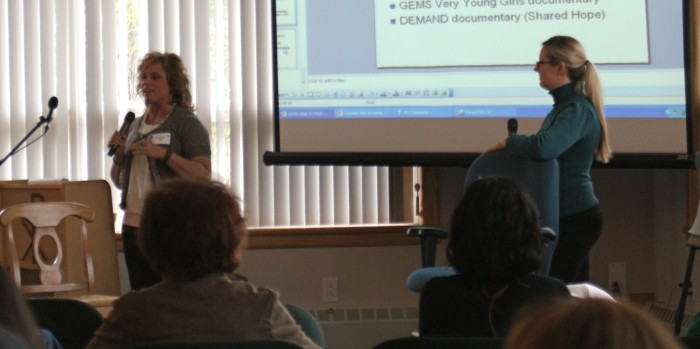It was great to see several months of planning and preparation come together. Shared Hope International had the honor of presenting our training series, Intervene, to over 150 social service providers and law enforcement officials last week in Pennsylvania. Intervene was designed by a multidisciplinary team in an effort to equip first responders with the tools to identify and effectively respond to victims of sex trafficking. The Berks Coalition Against Human Trafficking, Berks Women in Crisis and FREE, a local anti-trafficking group, sponsored the event in an effort to bring awareness about Domestic Minor Sex Trafficking to the area. Shared Hope International exposed the face of DMST by educating attendees on what makes an individual vulnerable, warning signs and indicators of trafficking, language unique to the crime, and the dynamics of pimp control – including the recruitment process and what factors prevent a victim from fleeing.
 Shared Hope was joined by District Attorney John Adams, Representative David Maloney, Detective Lee Wiley from the Montgomery Police Department, Julie Janovsky from Polaris Project, and survivor Jennifer Spry. Detective Wiley shared local stories, techniques and information on DMST, while Ms. Janovsky focused on law and policy. The testimony given by Ms. Spry was so powerful that it wrapped up with a standing ovation!
Shared Hope was joined by District Attorney John Adams, Representative David Maloney, Detective Lee Wiley from the Montgomery Police Department, Julie Janovsky from Polaris Project, and survivor Jennifer Spry. Detective Wiley shared local stories, techniques and information on DMST, while Ms. Janovsky focused on law and policy. The testimony given by Ms. Spry was so powerful that it wrapped up with a standing ovation!
Training is critical to the anti-sex trafficking movement because it changes how law enforcement officers and social service providers respond to victims of commercial sexual exploitation. The Reading Eagle, a local newspaper, insightfully pointed out that “Learning to identify the signs of sex trafficking of minors and the people selling and buying prostitution will better prepare a community to respond if it occurs.” Training assists in reducing the number of DMST victims who go through the social service system unidentified and unaided. “Training also exposes those on the front lines to the gravity of DMST in the U.S., and hopefully inspires them to revise their tactics for treating victims. Co-chair of Berks County Coalition Against Human Trafficking, Bob Morrison, expressed optimism for the future of the county when he told local news station 69News “There’s hope in seeing a whole community begin to talk about this and get mobilized.”
Thank you to everyone who attended the event. Click here if you are interested in bringing training to your community.






